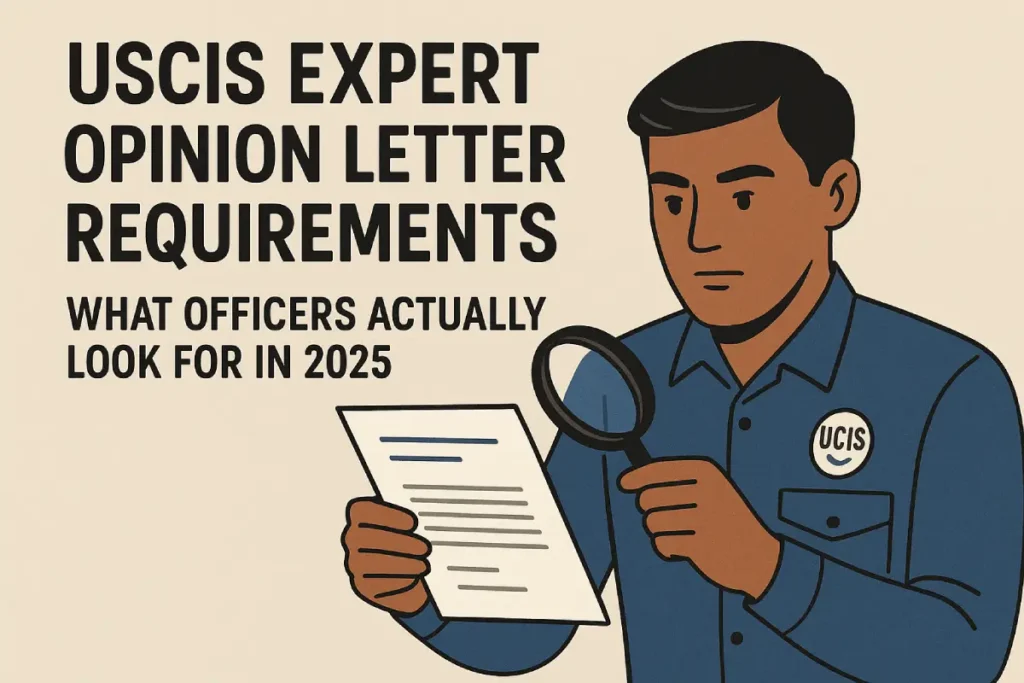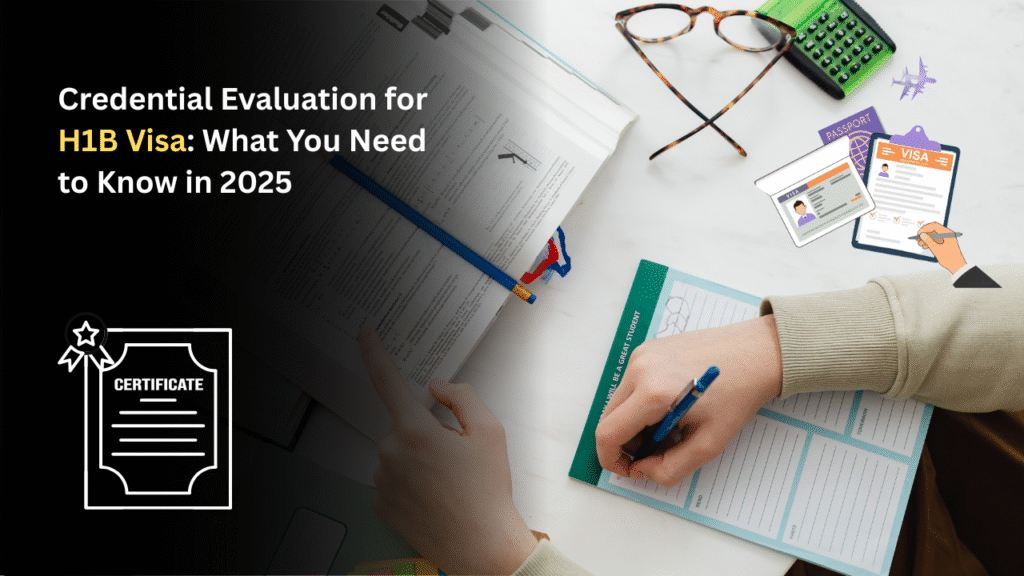Expert opinion letter requirements have grown more crucial to immigration application success in 2025. AAE Evaluations knows these specialized documents strengthen qualifications for various visa categories like EB-1, EB-2, O-1, H-1B visa, and L-1 applications. Our network of 200+ experts from fields like Computer Science, Mechanical Engineering, Medicine, and Law helps build stronger cases under USCIS scrutiny.
These immigration support letters prove particularly useful when responding to Requests for Evidence (RFEs). Specialty Occupation and Beneficiary Qualifications rank among the most frequent challenges. The EB-2 NIW (National Interest Waiver) petition needs a comprehensive immigration evaluation that aligns with specific USCIS requirements. H-1B applicants must show they hold an advanced degree or equivalent. Many use the 3-in-1 rule, which treats three years of relevant work experience as equal to one year of undergraduate coursework.
This piece delves into what USCIS officers seek in 2025. You’ll learn about different types of expert opinion letters and key components that meet current standards. We’ll highlight common red flags and show how our credential evaluation service at AAE Evaluations makes applications stand out. Letter costs typically start around $500. Quality qualifications assessment from established evaluation agencies often determines whether your immigration case succeeds or fails.
What USCIS Looks for in an Expert Opinion Letter in 2025
USCIS officers will review expert opinion letters with extra care in 2025. They look beyond basic endorsements to prove visa eligibility claims. Your application’s approval chances can improve when you know what these officers value most.
Independent assessment from a subject matter expert
Qualified individuals with no personal interest in the outcome provide the advisory opinions USCIS wants. These letters should come from a “U.S. peer group” in the applicant’s field, a relevant labor organization, or experts in the applicant’s area. Immigration officers consider third-party verification the life-blood of credibility.
Well-known researchers from prestigious institutions like Johns Hopkins University get more respect during the review process because of their 20-year-old reputations. The expert’s credentials face close examination. Their educational background, professional accomplishments, and industry standing affect how USCIS sees their opinion.
Matching USCIS visa-specific criteria
Each visa category has its own requirements. Immigration evaluations must address these criteria directly. H-1B petitions need proof that the position qualifies as a specialty occupation. O-1 applications must show extraordinary ability. The expert opinion letter should connect the applicant’s qualifications to these specific visa requirements instead of giving general endorsements.
EB-2 NIW petition letters must address all three prongs of the Matter of Dhanasar test with evidence-based claims. H-1B support letters should describe required tasks, show why a bachelor’s degree is needed, and include relevant industry data that backs these requirements.
Objective evidence over general praise
USCIS officers prefer solid evidence over vague praise. Generic compliments and template language raise red flags right away. Officers look for:
- Clear examples of the applicant’s measurable achievements
- Simple explanations of the applicant’s field influence
- Technical details about contributions in plain language
- Proof of international or national recognition
Peer-reviewed manuscripts provide great independent verification because they represent unbiased evaluations of the applicant’s work. USCIS checks if submitted letters match each other. They often reject all supporting documents if they seem template-based rather than individually written.
AAE Evaluations experts know these requirements well. We create custom immigration support letters that address visa-specific criteria. Our credential evaluation services connect qualifications to requirements through real data points and specific examples that meet USCIS standards.
Types of Expert Opinion Letters and When to Use Them
Different visa categories need specialized expert opinion letters that meet specific regulatory requirements. AAE Evaluations creates custom letters for many immigration scenarios. Each letter meets specific USCIS requirements. The right type of letter can affect your application’s success by a lot.
Specialty Occupation Analysis for H-1B
H-1B visas need proof that a position qualifies as a specialty occupation with specialized knowledge. A Specialty Occupation Analysis letter helps assess if the position needs at least a bachelor’s degree in a specific field. This immigration support letter gives a detailed look at:
- Job duties that need specialized skills and their complexity
- Industry standards for educational requirements
- The position’s match with USCIS specialty occupation criteria
These letters are a great way to get support when USCIS questions whether a position needs specialized knowledge or when the job title doesn’t clearly match traditional specialty occupations.
Work Experience Evaluation for Degree Equivalency
Work Experience Evaluations help candidates without formal U.S. degrees establish degree equivalency through the “three-for-one rule”. This rule means three years of specialized work experience equals one year of college-level education. It helps H-1B applicants with extensive professional experience but no formal degrees meet educational requirements.
The evaluation looks at how the candidate’s work history progressed and assesses their responsibilities. It shows how their experience matches academic equivalency. Professional experience equivalency letters become crucial for applicants who have lots of work experience but incomplete or foreign education credentials.
Combination Letters for RFEs
Combination letters help tackle Requests for Evidence (RFEs) by addressing multiple concerns at once. These detailed documents respond to specific USCIS objections. They blend specialty occupation analysis with assessments of beneficiary qualifications.
These letters connect all eligibility aspects instead of handling issues one by one. This approach builds a stronger petition and tackles specific RFE concerns head-on.
National Interest Waiver Letters for EB-2 NIW
The EB-2 NIW (National Interest Waiver) needs proof that skipping the job offer and labor certification requirements serves national interest. These specialized letters must cover all three parts of the Matter of Dhanasar test:
They need to show the substantial merit and national importance of the planned attempt. Next, they prove the applicant can advance this attempt. Finally, they demonstrate how waiving requirements benefits the United States.
NIW letters focus on the applicant’s effect on their field and potential U.S. contributions rather than just qualifications.
Extraordinary Ability Letters for O-1 Visa
The O-1 visa (extraordinary ability) needs proof that the applicant has “extraordinary ability” through sustained national or international acclaim. These letters must show the applicant belongs to the top performers in their field.
O-1 support letters need input from a peer group or professional association in the applicant’s field. USCIS guidelines say these letters should analyze the applicant’s achievements, recognition, and distinguished reputation compared to field peers.
AAE Evaluations has a network of 200+ credentialed experts in a variety of disciplines. We create custom letters for each visa category that meet current USCIS standards and highlight your case’s strengths.
Key Components USCIS Expects in a Letter
Expert opinion letters need several key components to pass USCIS review in 2025. These documents help strengthen immigration applications by providing third-party validation from qualified professionals who give objective assessments.
Expert’s credentials and authority in the field
The strength of an expert opinion letter starts with the writer’s qualifications. USCIS officers look at the expert’s authority to make meaningful assessments. A letter that works must have:
- Clear credentials showing the expert’s qualifications in their field
- Professional background with advanced degrees and certifications
- Proof that the expert can grant university-level credits
- A complete resume showing relevant experience
AAE Evaluations works with over 200 qualified experts in more than 20 fields, including Computer Science, Mechanical Engineering, Chemistry, Medicine, and Law. This wide range of expertise means they can match evaluators and applicants no matter what the specialty.
Detailed qualifications assessment of the applicant
USCIS wants a full review of the applicant’s background, beyond just the expert’s credentials. This qualifications assessment should:
- Give specific details about academic credentials and work experience
- Show how the applicant’s training and career growth match USCIS academic credit standards
- Describe the applicant’s achievements, technical skills, and contributions
- Review career growth and development of specialized knowledge
These assessments need lots of documentation, like academic transcripts, job verification letters, and detailed role descriptions. Experts must analyze these materials carefully instead of just listing them.
Connection to visa category requirements
The letters must clearly link applicant qualifications to specific visa requirements. This vital part:
- Meets exact USCIS criteria for each visa type
- Shows how the job connects to the knowledge and skills the visa requires
- Proves how the applicant’s background meets H-1B specialty occupation standards
- Reviews credentials against specific legal requirements for extraordinary ability cases
An O-1 visa letter looks very different from an H-1B evaluation, even for the same person. Each visa category has its own USCIS requirements, so cookie-cutter approaches don’t work.
Use of verifiable data and supporting documents
The most important part is adding proof throughout the assessment. USCIS looks for:
- Supporting documents that prove each claim
- Real results instead of just praise
- Public materials like articles, presentations, or awards
- Job verification and detailed role descriptions that match
AAE Evaluations follows these documentation rules strictly for all immigration evaluation services. Their expert opinion letters include complete reference materials, with prices ranging from $500-$800 based on delivery time.
These four key components create immigration support letters that stand up to USCIS review and give the proof needed for successful visa applications.
Common USCIS Red Flags and How to Avoid Them
USCIS officers know how to spot problems in expert opinion letters, which often leads to application denials or Requests for Evidence (RFEs). You can avoid getting pricey delays in visa approvals by learning these warning signs.
Generic language without field-specific context
USCIS doesn’t accept expert opinion letters that lack specialized terminology and industry-specific details. Officers have rejected evaluations that only give broad statements without technical context over the last several years. This happens most often with template-based content instead of custom assessments.
You can avoid this problem by:
- Breaking down job requirements with industry-standard terms
- Mentioning specific projects, technologies, or methodologies for the position
- Skipping vague statements like “she’s the best I’ve worked with”
- Writing unique content for each case
Letters from biased or unqualified sources
Letters from colleagues and supervisors give an explanation of the candidate’s abilities, but USCIS values these “inner circle” endorsements less because of potential bias. Officers also look closely at the letter writers’ credentials and don’t accept opinions from people who lack proper authority.
AAE Evaluations handles this issue well with a network of independent experts in a variety of fields. The best letters come from qualified professionals who can make authoritative assessments without having any personal interest in the application’s outcome.
Lack of arrangement with job description or SOC code
Immigration evaluation letters create another red flag when they don’t connect directly with the position’s Standard Occupational Classification (SOC) code and detailed job description. Officers quickly notice evaluations that only use information from petitioners without enough job details.
Your expert opinion letter should reference specific SOC code requirements and give a complete analysis of how the position meets specialty occupation standards.
Failure to address RFE-specific concerns
Many applicants submit generic materials instead of tackling the officer’s concerns when answering RFEs. The quickest way to succeed is to provide targeted evidence that speaks directly to identified problems.
AAE Evaluations creates RFE-specific letters that tackle USCIS concerns with solid evidence. Our experts study RFE language carefully and use exact wording from requests to show we understand the issues completely.
Your chances of visa approval will improve substantially if you watch out for these common warning signs. This approach helps you avoid unnecessary delays or complications.
Why AAE Evaluations Letters Meet USCIS Standards
AAE Evaluations has built its reputation by delivering expert opinion letters that go beyond USCIS requirements. Our approach targets the key elements that immigration officers look for when they review visa petitions.
200+ credentialed experts across 20+ disciplines
We have more than 200 subject matter experts in fields of all types – Computer Science, Mechanical Engineering, Chemistry, Business Administration, Medicine, Finance, Law, and many more. This expertise lets us pair applicants with evaluators who know their industry’s standards and requirements inside out. Each expert goes through careful vetting, credential checks, and performance reviews. This ensures your application gets support from the most qualified professionals.
Custom letters tailored to visa category and applicant profile
Generic documentation isn’t enough here. Our immigration evaluation starts by matching your case with the right expert based on your field’s needs. A dedicated specialist reviews your credentials and researches relevant standards. They create a detailed evaluation that addresses all criteria for your visa category. These credential evaluation services work well for both new applications and responses to Requests for Evidence.
Strict adherence to USCIS documentation standards
Our evaluators keep up with the latest USCIS requirements, approval patterns at different service centers, and evaluation standards. This attention to detail will give a letter with everything officers look for – verifiable data, objective evidence, and clear connections between qualifications and visa requirements. Our letters stand up to scrutiny during the adjudication process consistently.
Pricing: $500–$800 depending on turnaround time
AAE Evaluations keeps pricing transparent, from $500–$800 based on how quickly you need it. Your final cost might vary with visa categories and complexity, but we offer competitive rates without cutting corners. All immigration support letters come with a full assessment, expert credentials, and analysis customized to your case’s specific needs.
Conclusion: Securing Your Immigration Success With Expert Evaluation Letters
Expert opinion letters have become vital components for successful immigration petitions in 2025. This piece takes a closer look at what USCIS officers examine in these crucial documents for H-1B, EB-2 NIW, O-1, EB-1, and L-1 applications of all types.
Your immigration support letter must provide more than basic endorsements. Quality documentation should include independent assessment from qualified experts that lines up with visa requirements. USCIS looks for objective evidence instead of general praise, along with verifiable data backing all claims.
Each visa type needs its own specialized approach. H-1B petitions require focused specialty occupation analysis. EB-2 NIW applications must address the three prongs of the Matter of Dhanasar test completely. O-1 visas require proof of extraordinary ability through sustained national or international acclaim.
Strong applications can fail due to common red flags. Success depends on avoiding generic language, biased sources, and poor alignment with job descriptions. Applications must also properly address any RFE-specific concerns.
AAE Evaluations serves as your trusted partner through these complex requirements. Our network of 200+ credentialed experts in a variety of disciplines will give your application the right evaluation for your specific case. Professional credential evaluation services cost between $500-$800 based on turnaround time, making them available for different needs.
Visit https://aaeevaluations.com/ to discover how our specialized immigration evaluation services can build a stronger case and boost your approval chances. Quality qualifications assessment from our experienced professionals at AAE Evaluations will substantially improve your immigration experience’s outcome.
Your immigration success deserves expert support. Working with professionals who know exactly what USCIS officers want in 2025 gives your application the edge it needs to shine.
FAQs
Q1. What is a USCIS expert opinion letter and why is it important?
An expert opinion letter is a document written by a qualified professional that evaluates an applicant’s qualifications for specific visa categories. It’s crucial for immigration applications as it provides an independent assessment that helps demonstrate eligibility to USCIS officers.
Q2. How much does an expert opinion letter typically cost?
The cost of expert opinion letters generally ranges from $500 to $800, depending on the complexity of the case and the turnaround time required. This investment can significantly improve your chances of visa approval.
Q3. What are the key components USCIS looks for in an expert opinion letter?
USCIS expects expert opinion letters to include the expert’s credentials, a detailed assessment of the applicant’s qualifications, clear connections to visa category requirements, and use of verifiable data and supporting documents.
Q4. Can an expert opinion letter help with responding to a Request for Evidence (RFE)?
Yes, expert opinion letters can be particularly valuable when responding to RFEs. They can address specific concerns raised by USCIS, providing targeted evidence and analysis to strengthen your case.
Q5. How do I ensure my expert opinion letter meets USCIS standards?
To meet USCIS standards, ensure your letter comes from a qualified, independent expert, contains field-specific context, aligns with job descriptions and SOC codes, and provides objective evidence rather than general praise. Using a reputable evaluation service can help ensure these standards are met.



